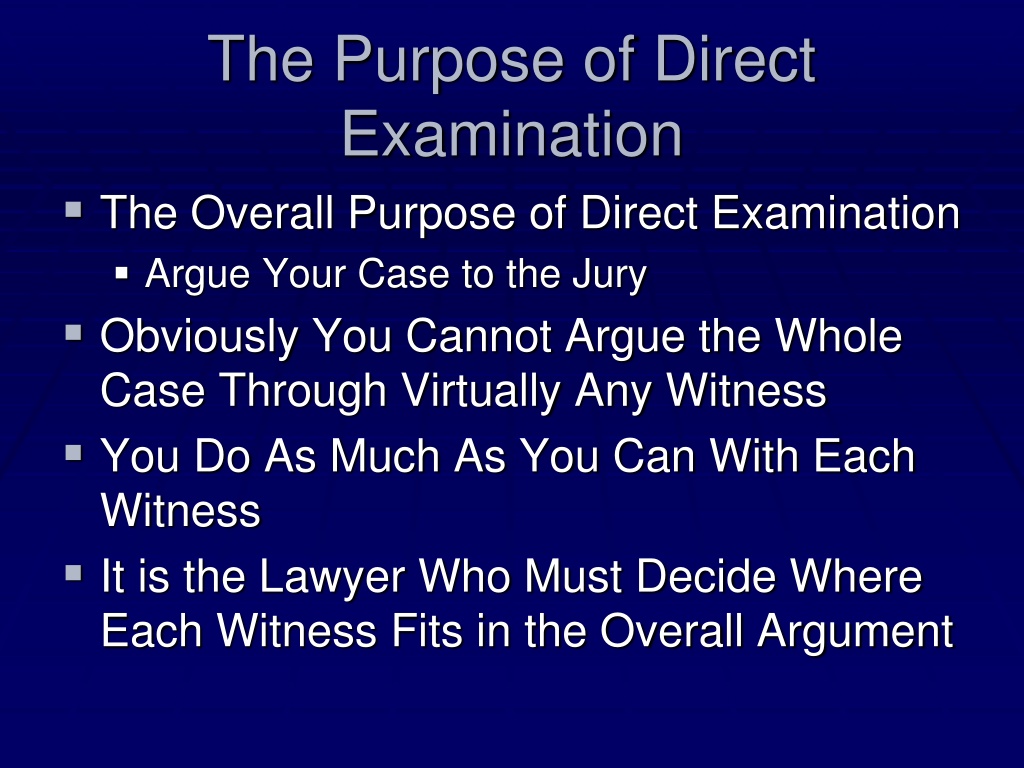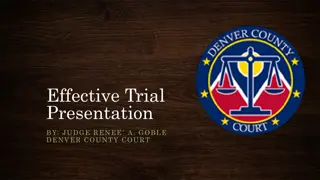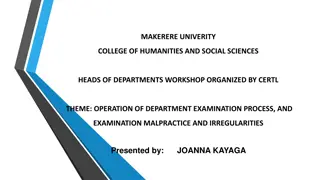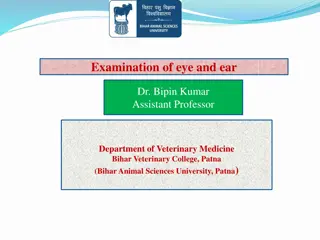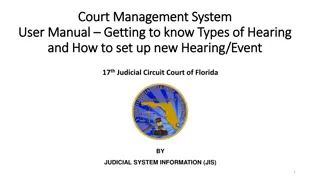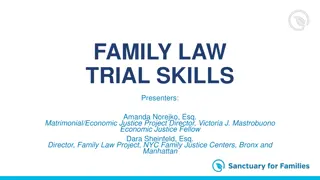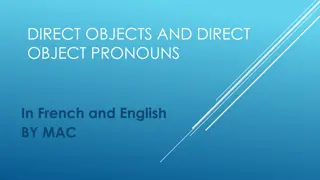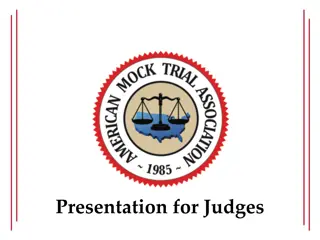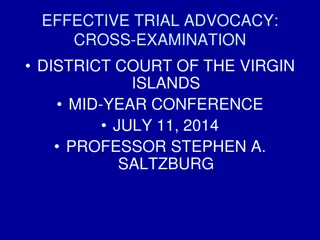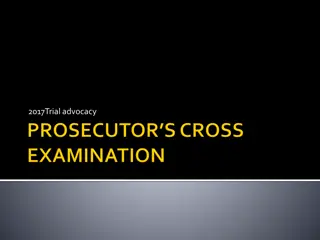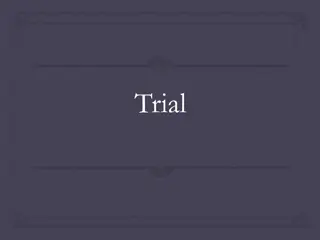Effective Direct Examination Strategies for Trial Advocacy
Direct examination plays a crucial role in presenting a case to a jury by arguing key points through witnesses. To be effective, testimony must be clear, credible, memorable, and broken into small bites. The lawyer controls the pace and emphasis, and leading questions should generally be avoided. Direct examination should not be a narrative and must emphasize important facts without overburdening the witness.
Download Presentation

Please find below an Image/Link to download the presentation.
The content on the website is provided AS IS for your information and personal use only. It may not be sold, licensed, or shared on other websites without obtaining consent from the author. Download presentation by click this link. If you encounter any issues during the download, it is possible that the publisher has removed the file from their server.
E N D
Presentation Transcript
The Purpose of Direct Examination The Overall Purpose of Direct Examination Argue Your Case to the Jury Obviously You Cannot Argue the Whole Case Through Virtually Any Witness You Do As Much As You Can With Each Witness It is the Lawyer Who Must Decide Where Each Witness Fits in the Overall Argument
EFFECTIVE TRIAL ADVOCACY: DIRECT EXAMINATION DISTRICT COURT OF THE VIRGIN ISLANDS MID-YEAR CONFERENCE JULY 11, 2014 PROFESSOR STEPHEN A. SALTZBURG
Four Tasks of Direct Examination 1. Testimony Must Be Clear If Not It is Worthless Must Break the Testimony into Small Bites 2. Testimony Must Be Credible Clear Without Credible is Worthless 3. It Must Be Invulnerable to X-Exam Destroyed on X-Exam, Less than Worthless 4. It Must Be as Memorable as Possible Especially on the Key Points of Your Case Small Bites and Repetition Help
ITS AN ARGUMENT You Argue As Much as You Can Through the Witness The Lawyer Makes the Argument by Asking Questions The Witness Provides the Answers
The Role of the Lawyer The Lawyer Controls Pace The Lawyer Controls Emphasis The Lawyer Chooses the Argument The Witness Just Answers Questions Most Bad Witnesses are Bad Because the Direct Examiner Left Them Exposed
FRE 611 (c) Leading Questions Generally should not be used on direct They may be used as may be necessary to develop the witness testimony With a hostile witness, adverse party, or witness identified with adverse party, interrogation may be by leading questions Ordinarily leading questions should be permitted on cross-examination More on leading questions later
Directs Should Not be Narratives Objectionable (although savvy lawyers don t object) Boring Does not Break Facts into Small Bites Does not Repeat the Important Facts Witnesses Who Work Too Hard Are Not Credible More on This in a Moment
Four Laws Always to Remember Primacy People Remember and Focus on What They Hear First Recency People Remember and Focus on What They Hear Last Frequency People Recall Things That Are Repeated Vividness People Understand Things Best When Those Things Are Vividly Portrayed
Who Uses The Four Laws? Lawyer or Witness Primacy It is the Lawyer Who Decides What Goes First By Questions Asked Recency It is the Lawyer Who Decides What Goes Last By Questions Asked Frequency The Right Questions Get Things Repeated Without Running Afoul of Asked and Answered Vividness Surprisingly, Questions that Enable Witnesses to Provide Vivid Testimony
Witnesses and Bias Witnesses Who Work Too Hard Appear Biased Witnesses Are Supposed to Answer Questions, Not Argue the Case Lawyers Make Witnesses Credible Personalize Them Allow Them to Emphasize Strong Points Allow Them to Repeat the Good Stuff
Introduce Your Witnesses Don t Have Your Head Down and Say to the Witness, Please State Your Name and Address for the Record The Jury Wants to Know About the Witness His or Her Name is Not Unimportant The Jury Wants to Know Whether the Witness is Someone They Can Trust Questions About Jobs, Family, Education, Experience Can Therefore Be Critical
Argue Through Your Questions You Ask Questions So that a Witness Provides the Answers that Make the Points You Want Made and that Bolster Your Theory of the Case Only You Can Decide How Many Questions to Ask, in What Order to Ask Them, and Whether a Point is Clearly Made As Long as the Witness Understands that He/She Need Only Answer Your Qs and Their Role in the Case, the Witness Relaxes Like a Dance Duo in Which You Lead
Looping Enables Emphasis and Argument By Looping, You Can Argue Your Case to the Jury and Emphasize the Things that Matter By Combining Open Ended and Closed Ended Questions, You Can Emphasize the Things that Matter By Having the Witness Diagram a Scene after Describing it, You Can Repeat the Good Stuff and Emphasize What Matters
An Example of Looping Q. Did You Hear Anything Unusual? A. I Heard the Roar of an Engine? Q. Did You Hear Anything Else Near the Time You Heard the Roar of the Engine? A. I Heard Tires Squeal?
More Looping Q. How Much Time Elapsed Between the Engine Roar and Tires Squealing? A. I Heard Them About the Same Time? Where Were You Standing When You Heard the Engine Roar and Tires Squealing? I Was a Few Feet from the Door of The School? How Far Away From the Road Were You When You Heard the Engine Roar and Tires Squealing?
No Asked and Answered Each Question is Different from the Preceding One The Objection Asked and Answered Will be Overruled Do You Really Care About the Details? Only to the Extent that You Are Able to Repeat and Argue the Points that You Want to Be Sure the Jury Understands and Remembers
Transition Questions Should Be Used Liberally Use Transition Questions Not really questions at all They Serve Function of an Outline E.g., I want to ask you some questions about your physical condition prior the accident I want to ask you some questions about your physical condition after the accident Now, I want to ask you some questions that compare your condition before and after
Written Out Questions Should You Write Out Questions? Why Would You? Remember the Points You Want to Make? No, You Would Write Out Answers Why Do Lawyers Write Out Questions? It is the Fear of Leading and Being Stopped with Objections
Problems with Written Questions Some Lawyers Practice Each Q and A with a Witness as Though It Were a Script This May Make Witnesses More Nervous What if the Judge Sustains an Objection to Qs and You Need the Material? What if the Witness Deviates from the Script? It is Not Necessary to Write Out Questions In Fact, You Should Focus on the Substance You Want to Elicit, Not Specific Words
Dont Worry So Much About Leading Remember that You Do Not Go to Hell For Asking a Leading Question With Some Witnesses You Will be Permitted to Lead Adverse or hostile witnesses Children Witnesses with Disabilities There are Times When You Must Lead a Forgetful or Nervous Witness
Saving the Witness and Your Case A Price-Fixing Case in Which the Witness is Cooperating with the Government and Describing Meetings in Which Pricing was Agreed Upon Q. Where was the second meeting? A. Uh, Uh, I m having a little trouble recalling. Q. Was it in Philadelphia? A. Objection! Court: Sustained. Q. Where was the second meeting? A. Philadelphia
Who Won? Who Lost? In the Previous Example, You Might Have Tried to Refresh Recollection with a Document You, However, Are Not Required to Do That Do You Want to Interrupt the Flow of Your Direct or Move it Along? Yes, An Objection was Sustained. So What Do You Think the Jury Liked the Objection? Do You Think the Jury Will Identify with the Witness or the Objecting Lawyer?
Who Knows What is Leading Anyway? Bank Robbery Case; Teller is the Witness Q. Was the Robber Tall? Leading? Q. How Tall was the Robber? Leading? Q. Was the Robber Tall or Short? Leading? Q. What Happened Next? Leading?
Definition of Leading Defined as Suggesting the Answer But Everything is Leading to Some Extent or Trials Would Never End Even What Happened Next? is Suggestive Judges Vary on Their Approaches to What is Leading At the Outer Margins, They Agree that What Happened Next? is Not Leading Was the Robber 6 feet, 4 inches? Is Leading In the Middle, All Bets Are Off
Dont Be Afraid Usually, If You Think of the Answer You Want the Witness to Give, The Question Will Come What Would Your Ask the Teller in the Robbery Case to Get the Teller to say: 1. The Robber Wore a Back Coat and Grey Pants 2. He Had a Bandaid on His Right Cheek 3. He Had a Gun in His Right Hand 4. He Was About 6 4 Tall 5. He Handed Me A Sack 6. He Told Me to Fill the Sack with Money or He d Shoot
Leading Without Leading: Choices If You Cannot Think of the Right Question, Offer a Choice Was the Second Meeting in Philadelphia, Chicago or Somewhere Else? Was the Robber Tall, Short or Medium? Choices Appear Not to Be Leading? Good! But Choices Enable the Examiner to Control the Subject Matter and Focus the Witness on It. Also Good.
If All Else Fails, Lead If You Cannot Think of a Question and You Need the Answer, then Lead Yes You May Get an Objection Unless You Do this Repeatedly, No Judge Will Care It is Vital that You Get from a Witness What You Need It is Better for You to Lead, Suffer Having an Objection Sustained, and the Get the Answer You Need than to Forego an Answer Because You are Fearful of Hearing Objection Sustained
Dont Try to Sound Like a Lawyer You Do Not Have to Ask Questions Like Where, if Anywhere, Did Your Go? What, if Anything, Did You Do? Who, if Anyone Went Along? Why Do Lawyers Ask Such Questions? They Sometimes Want to Sound Like Lawyers. Good? No! They Want to Sound Not-Leading. Necessary? No! Each of These Qs Can and Should Be Different
Avoid Exactitude on Direct Examination Exactitude is the Enemy of Direct E.g., Witness Says Robber was 6 4 Witness is Not a Human Ruler Better to ask Approximately How Tall Was He? Might He Have Been a Little Taller or Shorter? Protects the Witness from X-Exam Designed to Attack Certainty
Witnesses are Nervous About Conversations This is Understandable Witnesses Do Not Recall Word for Word What Was Said & Should Not Claim To Can You Remember Word for Word What You Said to Him and He to You? But, Can You Remember the Substance of the Conversation? Please Tell Us Who Spoke First? In Substance, What did He Say to You?
Nervous or Wordy Witnesses Must Tell Witnesses that You May Interrupt Them Explain This is Not Rudeness But Protection Opposing Counsel May Object that the Witness Didn t Finish the Answer Judge Will Ask: Are You Done? Answer is Yes Holding Up Your Hand May Stop a Runaway Witness
Dealing with Nerves Should You Videotape Your Witness and Watch the Tape with Them? What are the Risks of Discovery? Should You Write Out a Sample Script for the Witness to Practice? Again, What are the Risks of Discovery? Should You Take a Witness Into a Courtroom to Give Them a Feel for It? Probably Little if any Risk
A Recess Can Help When a Witness, Especially an Important One, is Very Nervous, You Might Consider Putting the Witness on to Talk About Background (Family, Work, etc.) and then Seek a Recess Many Witnesses Relax Once They Get a Feel for the Q and A and a Sense of Being on the Stand
Exhibits Mark Them All Ahead if Possible Know the Court s Rules Foundation I Show You What Has Been Marked for Identification as _____ s Exhibit ___ Can You Identify It? What is It? Photos or Tapes: Is it a Fair (True) and Accurate Representation of [Whatever]?
Additional Authentication If It is Not Obvious That Your Witness Has Personal Knowledge of An Exhibit, You Might Want to Ask Additional Questions If a Witness Says, That s My Hotel Bill Further Questions Are Not Needed If a Witness Says, That is a Letter that the Defendant Wrote You Might Need to Make Clear How the Witness is Able to Identify It as the Defendant s
Moving Exhibits Many, if not Most, Exhibits are Used to Corroborate Testimony and Have Little Independent Value A Key Tactical Judgment is When to Offer an Exhibit If You Are At An Important Point in Your Examination, Moving an Exhibit Into Evidence May Result in Your Adversary Asking for a Voir Dire in Aid of An Objection This May Interrupt the Flow of the Examination
Voir Dire Most Judges Will Give an Adversary a Chance to Ask Some Questions if He or She Claims it Might Aid or Avoid an Objection Jury May or May Not Be Excused Jury Present May Hear Something Direct Examiner Did Not Want Heard Jury Absent Gives Adversary a Chance to Explore More Widely and May Be a Longer Interruption
If You Want to Use the Exhibit, Move It You Must Get an Exhibit Admitted Before You Can Show It To the Jury So If You Need the Jury to See It, You Must Move Its Admission and Take The Risk of a Voir Dire If You Don t Need The Jury to See It in the Moment, You Can Wait Till the End of the Examination and Move Any Exhibits Not Yet Admitted At the End Voir Dire is Much Less Likely Because the Adversary is Anxious to X-Examine You Can Re-Authenticate Easily if the Judge Is Unsure Whether You Laid a Foundation
FRE 607 Permits Any Party to Impeach Any Witness You Should Consider Motions In Limine to Exclude Impeachment Evidence Directed at Your Witnesses If the Court Rules that Impeachment is Permissible, You often Will Bring Out the Impeachment Material Yourself Your Goal, Of Course, Is Not Really to Impeach; It is To Take the Sting Out of X-Examination and to Offer the Evidence in the Least Damaging Way
Organizing the Direct Primacy and Recency: Start and End Strong Don t Get to the Impeaching Material Until Close to the End The Longer the Jury Hears and Believes the Witness, the More It Will Excuse Deficiencies But Don t End on the Impeaching Material Transition Qs Permit You to Go Back and Forth in Time and Place; Choose the Most Persuasive Way to Make a Point Through a Witness
